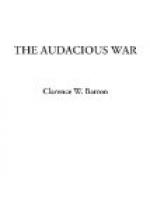Everybody in Germany is called upon to lend a hand in maintaining the supply of gold for the government. The patriotism of the people was first appealed to. Then laws were passed. People are “requested” to give up their jewelry, to make a patriotic sacrifice of it for the Fatherland. Cards are printed in the newspapers urging the people for the sake of the Fatherland to bring all their gold into the Reichsbank.
So fine is the search for gold that wedding rings are given from the fingers of the women, and iron rings are substituted as badges of patriotism.
While every other nation on earth since 1900 has been accumulating gold in bank reserve, England alone has stood aloof and accumulated credit instead of gold. English financiers laugh at gold except as it can be made useful. They prefer to hold interest-bearing promises to pay gold. To-day England holds the keys to the world’s gold outside of Germany, and I have a suspicion that she is not averse to American cotton going into Germany if it takes out the gold in return.
Germany is young as a banking, trading, and industrial nation. England insists that both men and gold must be at work. In Germany the gold reserve must be maintained and, with foreign trade cut off, men must be idle. In England both the gold and the men are at work. Labor was never better employed in England than to-day. The English policy in this wartime is to fill every idle hand with productive industry; to work the machinery day and night; and to keep the gold in England so far as is necessary and to keep it circulating in England. The national loss begins when you lose either the golden days of labor, the gold of the sunshine that makes the harvest of the valleys or the gold of finance and commerce.
When the Germans fought the French in 1870, 60 per cent of her people lived on the land. Now, forty-four years later, she is fighting the whole world, but only 30 per cent of her people live by the fruit of the soil.
That is the simple answer as to why Germany, a country besieged, cannot win against the world.
Germany has no sea-expansive ability, no foreign credit, no international reserves to carry out an offensive warfare. Her only possibility of success lay in a sudden and decisive march over the rich territory of France, the possession of Paris, and a huge indemnity tax levy as in 1871. The rest might have been easy. Hence the supreme military necessity for a quick drive through Belgium, the only open road to Paris. The size of the crime in Belgium has shown the supreme financial necessity. There was no military necessity for the outrage against the free Belgian people—only the economic necessity.
There is nothing left for Germany but a defensive warfare, a warfare now conducted upon foreign soil just over her own borders—the burden upon the enemy, the supply base near at hand.
Germany must reduce and conserve her shell-fire. The Krupp works have no ability to turn out daily the number of shells that Germany was exploding, and the United States in its own arsenals could not in a year make a week’s supply of shells at the rate at which they were being exploded from Switzerland to the English Channel.




